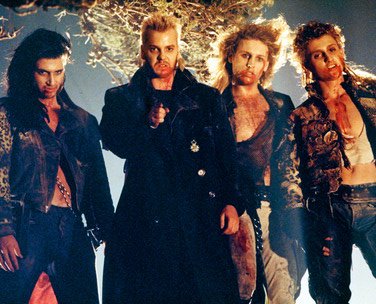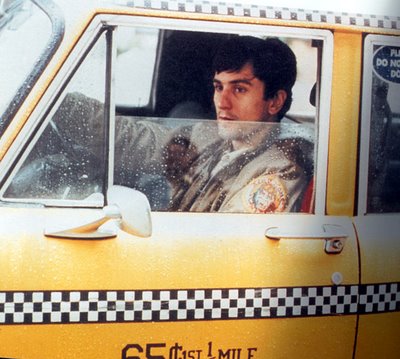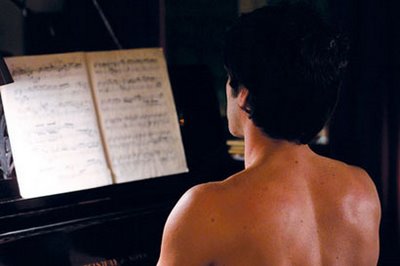
An insufferable film snob wanders off the beaten track, then comes back and talks about what he has seen.
Tuesday, October 31, 2006
Monday, October 30, 2006
Sunday, October 29, 2006
"Poets of Filmlight"
“Connie did something I could never explain, and I’ve talked to other cinematographers about this. How could he light something to be incredibly stylized and still make it look so naturalistic? It almost doesn’t make sense. But if you analyze his work shot by shot, especially toward the end of his career, it’s very stylized. Light just doesn’t happen that way, but when it’s onscreen, it doesn’t create a barrier between the story and the audience at all. It feels absolutely realistic.”
Emmanuel Lubeski

Butch Cassidy and the Sundance Kid, 1969

Cool Hand Luke, 1967

Road to Perdition, 2002 (I love the Hopper-esque look of this film)
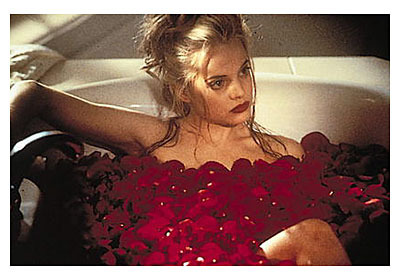
American Beauty, 1999

Electra Glide in Blue, 1973 (Great, under-rated cinematography)

Marathon Man, 1976
Friday, October 27, 2006
Tuesday, October 24, 2006
The Clockmaker

When we first meet Michel Descombes, he's right in his element. He's sharing a meal with a few friends, trading bullshit, and talking about the things friends talk about: Politics, women, television. This scene, as informal and easy is it is, introduces something that will be an undercurrent throughout the movie: The role of socialist politics in French society.
Back at his clock shop the next day, Descombes is interupted by two police officers, who enquire about his missing truck. Descombes says that he assumes his son Bernard has it. He goes with the two cops and passes the truck abandoned on the road, and this leads to the revelation that his son has killed a man named Rozon, and has gone on the run, along with his girlfriend.
The cop investigating the case is Inspector Guilboud (Jean Rochfort), and a curious relationship develops between he and Descombes. Descombes' initial fear is that the police will shoot Bernard when they see him, but Gilboud re-assures him that that "only happens in the movies". The film provides multiple encounters between the two men, and it's curious that none of them are in "police" situations. Guilboud runs into Descombe while grocery shopping, or walking his dog, and the two men talk. These encounters are what start to point up to Descombes how little he really knows his son. Time and time again, his response to one of Guilboud's questions is "I don't know....He didn't talk to me".
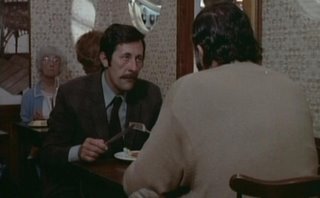 One of these interviews reveals a woman named Madelaine, who looked after Bernard when he was young, and Descombes hunts her down to see if she has had any contact. She has, indeed, and amazingly seems to know far more about Bernard than his father. Unbeknownst to his father, Bernard had visited her several times, and from hearing her talk, it's plain that Bernard views her as a mother figure.
One of these interviews reveals a woman named Madelaine, who looked after Bernard when he was young, and Descombes hunts her down to see if she has had any contact. She has, indeed, and amazingly seems to know far more about Bernard than his father. Unbeknownst to his father, Bernard had visited her several times, and from hearing her talk, it's plain that Bernard views her as a mother figure.
It's also fair to mention the way French politics creep into the story. The murdered man is a former soldier, who had served in Indochina and Algeria, and was also the owner of the factory where the girlfriend worked, and the film shows both halves of the political spectrum having their way with the facts of the case. The right sees the chance to associate the murder of a "war hero" with the subversive left, while the left paints Rozon as a lecherous capitalist monster.
For a film that revolves around a murder, it's surprising how little time it spends on the nuts and bolts of the investigation. Bernard doesn't even appear onscreen until the film is over an hour gone. No, The Clockmaker is really about Michel Descombes, and his realization that he may lose his son without really knowing him. After Bernard's arrest, Descombes becomes obssessed with supporting his son, probably to Bernard's detriment. Guilboud puts forth a theory for why the murder occurred - Rozon may have raped the girlfriend, and she told Bernard about it. If this was the case and it was a "Crime of Passion", then years could be trimmed off his sentence. Bernard denies this theory, and Descombes stands by his son's story. The boy gets twenty years.
The Clockmaker was the first feature turned out by Bertrand Tavernier, who had originally been a law student and a critic for Cahiers Du Cinema. His films are universally of high quality , and they cut across lines of genre and style. The actor Philippe Noiret was with him in the beginning as Michel Descombes, and has been there many times since, in films like The Judge and the Assassin and the great noir Coup De Torchon. Noiret is the anti-leading man. Big, silent and perpetually rumpled, he looks more like the guy who'd come to fix your furnace than a movie star, but his everyman quality has been vital to the feel of Tavernier's films.
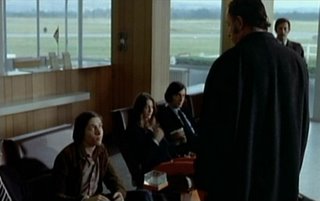
Watch Noiret as he sees his son behind bars at the film's close. The tension between the two is gone now, and Descombes talks about the girlfriends' baby on the way, and recounts a story about his days in WW2. After he finishes, he smiles and muses, "I don't know why I told you that". Maybe he doesn't , but he should - It's the kind of thing that he didn't do for all those years. As he walks away from the prison, he absent-mindedly touches the walls of the prison and a small smile comes over his face, as he savours this intimate little moment with his son. Better late than never.
Sunday, October 22, 2006
Moments of Distinction
The Set-Up - Opening night at a swank new restaurant has spun out of control.

The catalyst for the party has been this single loud American.
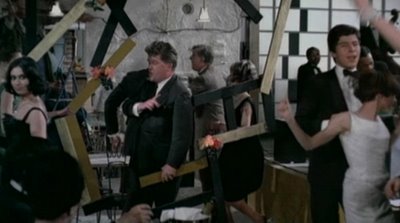 The band finally gives it up, and stops playing.
The band finally gives it up, and stops playing.
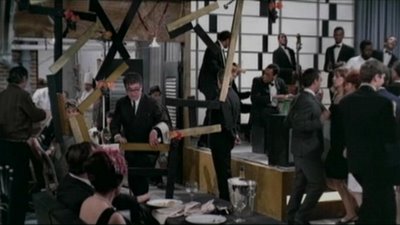 The American finds out that the pretty brunette in the green dress (Barbara Denneck) can play the piano, and urges her to sit down and give it a go.
The American finds out that the pretty brunette in the green dress (Barbara Denneck) can play the piano, and urges her to sit down and give it a go.
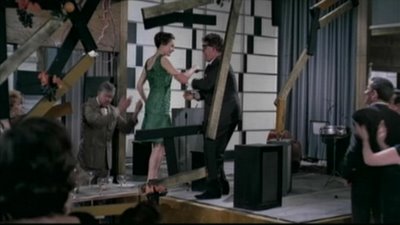 She starts to play.
She starts to play.
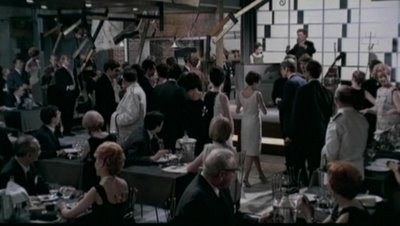
Playtime is a film crammed full of great moments, but this one has always had a special resonance with me. The sequence in the restaurant builds and builds, and then, at the moment that Denneck starts to play, all the hubbub evaporates. As much as I love this film, I’ve always thought that the restaurant bit goes on a tiny bit too long. Tati may have also thought that the audience needed a refresher at this point, and that’s what the piano sequence feels like to me. It’s like easing yourself into a hot bath.
Saturday, October 21, 2006
And Also Starring... (Hitchcock Blog-a-thon)
Here’s a trivia question for you. What actor appeared in the most Hitchcock films? (Not counting cameos) James Stewart? Grace Kelly? Cary Grant? Those are all good guesses, but they are also all wrong.
The answer is Leo G. Carroll, who appeared in six films for Hitch. You would likely remember him as Ruth Roman’s senator father in Strangers On a Train, or as the intelligence agent known as The Professor from North By Northwest. The others are Spellbound, Rebecca, Suspicion, and the little-seen The Paradine Case.
Senator Morton in SOAT is notable in that the character isn’t a contrived blowhard mandated by the plot. It would have been way too easy to make him the pompous politician trying to keep his daughter away from the potential murderer (Farley Granger). Instead, Morton supports Granger’s Guy, and works to help him. It’s a refreshing use of a character actor.
Watch for Carroll the next time you watch The Bad and the Beautiful, The House on 92nd Street, or The Parent Trap. He also had a regular gig as Alexander Waverley on TV's The Man from UNCLE.
Part of the Alfred Hitchcock blog-a-thon hosted by Squish at The Film Vituperatum.
Friday, October 20, 2006
Dialogue I Love
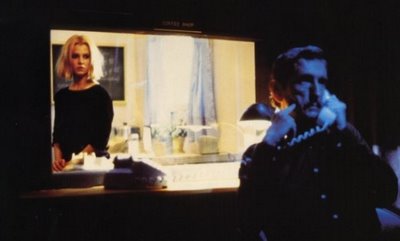 JANE: Howdy.
JANE: Howdy. TRAVIS: Howdy.
TRAVIS: Can I tell you something?
JANE: Sure. Anything you like.
TRAVIS: It's kind of a long story.
JANE: I got plenty of time.
TRAVIS: I knew these people...
JANE: What people?
TRAVIS: These two people. They were in love with each other. The girl was... very young, about seventeen or eighteen, I guess. And the guy was... quite a bit older. He was kind of raggedy and wild. And she was very beautiful, you know?
JANE: Yeah.
TRAVIS: And together, they turned everything into a kind of adventure, and she liked that. Just an ordinary trip down to the grocery store was full of adventure. They were always laughing at stupid things. He liked to make her laugh. And they didn't much care for anything else because all they wanted to do was to be with each other. They were always together.
JANE: Sounds like they were very happy.
TRAVIS: Yes, they were. They were real happy. And he... he loved her more than he ever felt possible. He couldn't stand being away from her during the day when he went to work... so he'd quit. Just to be at home with her. Then he'd get another job when the money ran out, and then he'd quit again. But pretty soon, she started to worry.
JANE: About what?
TRAVIS: Money, I guess. Not having enough. Not knowing when the next check was coming in.
JANE: I know that feeling.
TRAVIS: So he started to get kind of... torn inside.
JANE: How do you mean?
TRAVIS: Well, he knew he had to work to support her, but he couldn't stand being away from her, either.
JANE: I see.
TRAVIS: And the more he was away from her, the crazier he got. Except now, he went really crazy. He started imagining all kinds of things.
JANE: Like what?
TRAVIS: He started thinking that she was seeing other men on the sly. He'd come home from work and accuse her of spending the day with somebody else. Then he'd yell at her and start smashing things in the trailer.
JANE: The trailer?
TRAVIS: Yes, they were living in a trailer home.
JANE: Excuse me, sir, but were you in to visit me the other day? I don't mean to pry.
TRAVIS: No.
JANE: Oh, I thought I recognized your voice for a minute.
TRAVIS: No, it wasn't me.
JANE: Uhm. Please go on.
TRAVIS: Anyway, he started to drink real bad. And he'd stay out late to test her.
JANE: What do you mean, "test her" ?
TRAVIS: To see if she'd get jealous.
JANE: Huh! Uhuh.
TRAVIS: He wanted her to get jealous, but she didn't. She was just worried about him, but that got him even madder.
JANE: Why?
TRAVIS: Because he thought that, if she'd never get jealous of him, she didn't really care about him. Jealousy was a sign of her love for him. And then, one night... one night, she told him she was pregnant. She was about three or four months pregnant, and he didn't even know. And then, suddenly, everything changed. He stopped drinking and got a steady job. He was convinced that she loved him now because she was carrying his child. And he was going to dedicate himself to making a home for her. But then a funny thing started to happen.
JANE: What?
TRAVIS: He didn't even notice it at first. She started to change. From the day the baby was born, she began to get irritated with everything around her. She got mad at everything. Even the baby seemed to be an injustice to her. He kept trying to make everything all right for her. Buy her things. Take her out to dinner once a week. But nothing seemed to satisfy her. For two years he struggled to pull them back together like they were when they first met, but finally he knew that it was never going to work out. So he hit the bottle again. But this time it got... mean. This time, when he came home late at night, drunk, she wasn't worried about him, or jealous, she was just enraged. She accused him of holding her captive by making her have a baby. She told him that she dreamed about escaping. That was all she dreamed about: escape. She saw herself at night running naked down a highway, running across fields, running down riverbeds, always running. And always, just when she was about to get away, he'd be there. He would stop her somehow. He would just appear and stop her. And when she told him these dreams, he believed them. He knew she had to be stopped or she'd leave him forever. So he tied a cowbell to her ankle so he could hear her at night if she tried to get out of bed. But she learned how to muffle the bell by stuffing a sock into it, and inching her way out of the bed and into the night. He caught her one night when the sock fell out and he heard her trying to run to the highway. He caught her and dragged her back to the trailer, and tied her to the stove with his belt.
He just left her there and went back to bed and lay there listening to her scream. And he listened to his son scream, and he was surprised at himself because he didn't feel anything anymore. All he wanted to do was sleep. And for the first time, he wished he were far away. Lost in a deep, vast country where nobody knew him. Somewhere without language or streets. He dreamed about this place without knowing its name. And when he woke up, he was on fire. There were blue flames burning the sheets of his bed. He ran through the flames toward the only two people he loved.... but they were gone. His arms were burning, and he threw himself outside and rolled on the wet ground. Then he ran. He never looked back at the fire. He just ran. He ran until the sun came up and he couldn't run any further. And when the sun went down, he ran again. For five days he ran like this until every sign of man had disappeared.
Paris, Texas - written by Sam Shepard and Kit Carson
Tuesday, October 17, 2006
Friday, October 13, 2006
Dialogue I Love
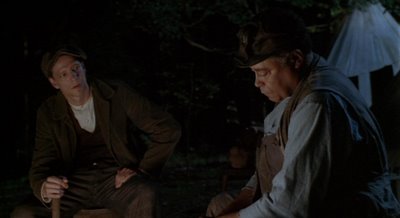
“When I was in Leavenworth, there was a bunch of Mennonites – In cuz they wouldn’t fight in the war. ‘Gainst their religion. It’s also against their religion to shave their beards or wear buttons on their clothes, and they were being forced to do both by the prison guards. So they refused to work. Went on a strike, right there in Hell’s Half Acre.
They were handcuffed to the bars of a cellhouse, eight hours a day for two full weeks. They were put with their hands up like this, so’s they had to stand on their toes, or those cuffs would cut into their wrists. Can’t nobody stand on their toes for eight hours.
Pretty soon their fingers would start to swole up, and they’d turn blue and then crack open, and the blood would run down their arms – Eight hours a day, day after day, and still they wouldn’t work, still they tore the buttons off their uniforms every time they were sewed back on. Tore em’ with their teeth, cuz their hands wouldn’t close no more.
Now, I don’t claim a thing for myself, but them fellas never lifted a gun in their lives, you couldn’t find any braver in my book.”
Matewan, written by John Sayles
Thursday, October 12, 2006
"Poets of Filmlight"
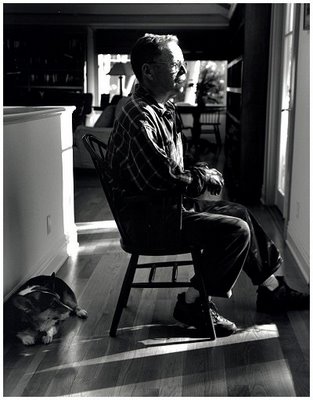 Michael Chapman with his dog Eyemo, Los Angeles, 2000
Michael Chapman with his dog Eyemo, Los Angeles, 2000
copyright Piotr Jaxa - Photo from the collection "Cinematographers - Poets of Filmlight"
It’s hard to associate the image above with the carnage of films like Raging Bull and Taxi Driver, isn’t it? The grandfatherly Chapman was critical in the success of those two brutal Scorsese masterpieces, and a quick scan of his resume reveals a stunning diversity. There’s the blood and guts of the teenage vampire flick The Lost Boys, and the black and white mastery of Steve Martin’s Noir farce Dead Men Don’t Wear Plaid. There’s Paul Schrader’s gutter fable Hardcore on one hand, and Kindergarten Cop on another.
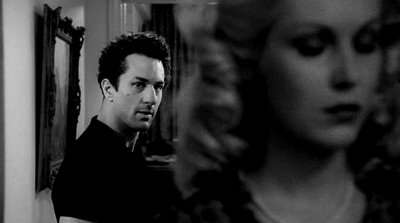 Raging Bull, 1980
Raging Bull, 1980
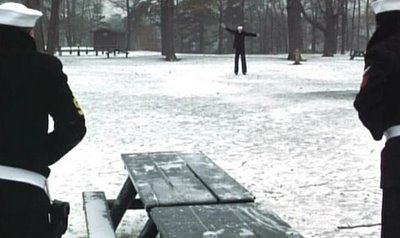 The Last Detail, 1973 (Thanks to Richard Gibson for this image)
The Last Detail, 1973 (Thanks to Richard Gibson for this image)
Friday, October 06, 2006
Wednesday, October 04, 2006
Moments of Distinction
The Set-Up – Nana (Anna Karina) is at a pool hall with her pimp Raoul. While he does some business, she does a little impromptu dance.
She fires up the juke-box.
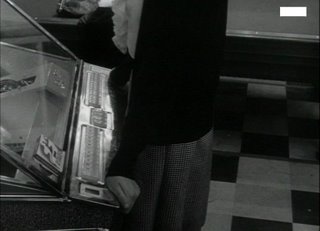 And away she goes.
And away she goes.
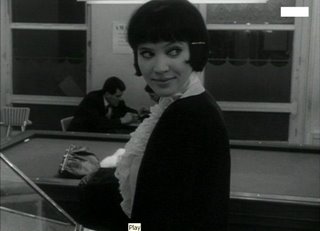 She flirts with a young guy, who doesn’t seem too interested. What an idiot.
She flirts with a young guy, who doesn’t seem too interested. What an idiot.
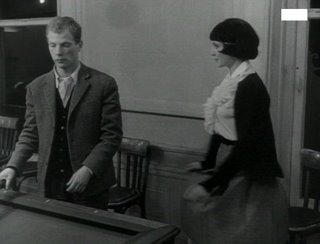
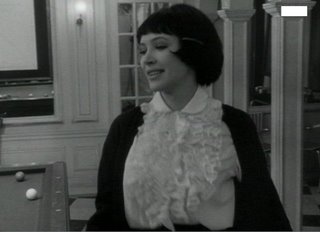

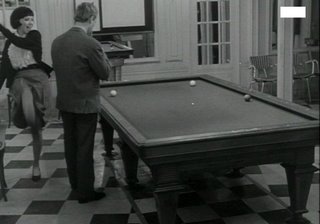
If you have read any of my entries in this series, you will see me use words like “coalesce”, and “crystallize”. Well, in this case, things are much simpler. I love this moment because it gives me a big stiffy. Seeing it in stills can’t possibly do justice to how sexy she is here. Sexy, yet sweet at the same time.








